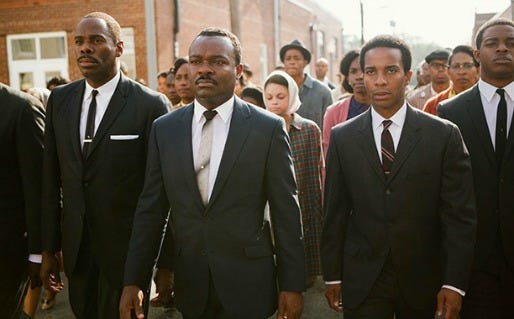Selma

"Selma" has been mislabeled as "the Martin Luther King Jr. movie," which it is not, just as the three months of demonstrations for black voting rights in 1965 Alabama was not merely his doing. (Others had been organizing and protesting for two years before King arrived.)
The drama, directed by Ava DuVernay from a screenplay by Paul Webb, is a bit stodgy at times — characters sometimes feel like they're reciting speeches instead of talking to each other. It also takes a bunch of well-publicized liberties with the historical record, such as depicting President Lyndon Johnson (Tom Wilkinson) as MLK's chief antagonist in opposing the Voting Rights Act, when the two coordinated closely. (And it was Robert Kennedy who unleashed the FBI to spy on King on his cohorts, not LBJ.)
Still, it depicts several moments possessing great power, such as the recreation of the "Bloody Sunday" event in which state troopers ran down defenseless non-violent protestors marching in Alabama from Selma to Montgomery. DuVernay brings to life the incredible struggles during the Civil Rights era, especially the pervasive sense of African-Americans being marginalized and oppressed.
Some of the quieter moments are the best, such as when a workaday woman (Oprah Winfrey) attempts to register to vote and is given an impossible citizenship test by the court clerk. (After correctly answering how many county judges are in Alabama [67], she is instructed, "Name them.") The reality of Jim Crow would not begin to fade until hearts and minds were changed, not just laws passed.
I'm a bit ambivalent about the performance of David Oyelowo as King. Impressions are the shallowest portion of capturing a public figure's persona, but MLK's musical cadences during his speeches are so inextricably linked to his iconography that it's distracting when Oyelowo conspicuously avoids them. (Imagine someone playing Winston Churchill without the gravelly growl.)
Undoubtedly, some of this criticism is unfair. King is such a giant in our national heritage, the closest thing we have to a secular saint, that any attempt to depict him is fraught with all sorts of challenges. We bring so much baggage into the theater with us that watching the film becomes an exercise in separating our conception of him from what we see onscreen.
The movie depicts King as a man of great conviction but also one of cold calculation, who knew he was putting others in harm's way — counting on bloodshed, even, to capture headlines and newscasts. In one somewhat shocking moment, he cheers the presence of a backward hillbilly sheriff, since he can be counted upon to split skulls and generate sympathy.
Webb's screenplay does a poor job of working in the other civil rights giants who organized the Selma protests, including James Bevel (Common) and Hosea Williams (Wendell Pierce). They wind up as a vague chorus of hangers-on and also-rans.
Stephan James stands out as John Lewis, then a college student beaten bloody during the march (and now a Congressman), as does Keith Stanfield as Jimmie Lee Jackson, murdered in cold blood by police.
It's rather disappointing that "Selma," directed by an African-American woman, does a rather poor job of representing black women in other than window-dressing roles. Winfrey (also a producer) has little more than a cameo, and Lorraine Toussaint is a frequent, vivid screen presence who gets to say astonishing little. (Other than one contrived-sounding speech, she barely has any lines.)
Carmen Ejogo as Coretta Scott King is largely relegated to the home front, clutching and fretting over threats to her husband and children.
"Selma" is the sort of movie that earns respect but not ardor. It tackles a big subject, and fleshes it out reasonably well, but labors to find the passion and beating hearts of those brave marchers in Selma.
4 Yaps

